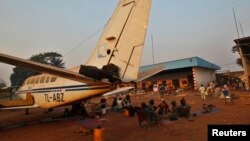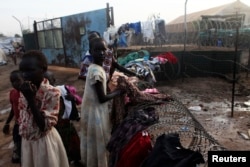GENEVA, SWITZERLAND —
U.N. humanitarian agencies are calling for immediate contributions to fund emergency aid in the Central African Republic and South Sudan. The agencies say desperate millions in these war-torn countries are suffering from lack of food, medical care and other basic needs because appeals are going unheeded.
The United Nations said the crises in South Sudan and the Central African Republic comprised one of the biggest refugee and internal displacement situations seen in Africa in recent years.
Despite multiple and desperate pleas for support from international donors, U.N. humanitarian appeals launched in December remain woefully underfunded. To date, the U.N. has received less than one-sixth of its $552 million appeal for CAR and only about one-fifth of its $1.27 billion appeal for South Sudan.
The spokeswoman for the U.N. refugee agency, Melissa Fleming, told VOA it was a struggle to provide even the minimum amount of aid needed because the money to do so was simply not there.
“We are appealing for money because with money we can provide a tremendous amount of aid to people we can reach. We can help refugees in particular, but also many parts of South Sudan and also inside CAR are accessible to us and the more funding we have, and I speak for all of our partners, the more we are able to do to help these people… And we are seeing signs of really desperate people in terrible states of health leaving both South Sudan and CAR,” she said.
The United Nations estimates more than 739,000 people are internally displaced in South Sudan and nearly 200,000 others have fled as refugees to neighboring countries.
Currently, U.N. figures put the number of internally displaced in the CAR at more than 700,000 and the number of refugees at more than 290,000.
Fleming said many of the CAR refugees were struggling with illness and disease.
“We are really noticing a trend in all refugees that they are in very poor physical shape. Some are suffering from malaria, diarrhea, respiratory infections. Many have been hiding in the bush for up to even one year in the Central African Republic, which has significantly impacted their state of health. Also, very disturbingly, many children under the age of five are showing varying degrees of malnourishment,” she said.
The spokeswoman said that food shortages in South Sudan have propelled increasing numbers of people to walk long distances in search of asylum in Ethiopia. They arrive in terrible condition. She says more than a fourth of all refugee children are suffering from acute or severe acute malnutrition.
UNHCR’s Fleming said the countries of refuge, such as Chad, Cameroon and Ethiopia, were incapable of caring for the growing number of people crossing their borders.
The United Nations said the crises in South Sudan and the Central African Republic comprised one of the biggest refugee and internal displacement situations seen in Africa in recent years.
Despite multiple and desperate pleas for support from international donors, U.N. humanitarian appeals launched in December remain woefully underfunded. To date, the U.N. has received less than one-sixth of its $552 million appeal for CAR and only about one-fifth of its $1.27 billion appeal for South Sudan.
The spokeswoman for the U.N. refugee agency, Melissa Fleming, told VOA it was a struggle to provide even the minimum amount of aid needed because the money to do so was simply not there.
“We are appealing for money because with money we can provide a tremendous amount of aid to people we can reach. We can help refugees in particular, but also many parts of South Sudan and also inside CAR are accessible to us and the more funding we have, and I speak for all of our partners, the more we are able to do to help these people… And we are seeing signs of really desperate people in terrible states of health leaving both South Sudan and CAR,” she said.
The United Nations estimates more than 739,000 people are internally displaced in South Sudan and nearly 200,000 others have fled as refugees to neighboring countries.
Currently, U.N. figures put the number of internally displaced in the CAR at more than 700,000 and the number of refugees at more than 290,000.
Fleming said many of the CAR refugees were struggling with illness and disease.
“We are really noticing a trend in all refugees that they are in very poor physical shape. Some are suffering from malaria, diarrhea, respiratory infections. Many have been hiding in the bush for up to even one year in the Central African Republic, which has significantly impacted their state of health. Also, very disturbingly, many children under the age of five are showing varying degrees of malnourishment,” she said.
The spokeswoman said that food shortages in South Sudan have propelled increasing numbers of people to walk long distances in search of asylum in Ethiopia. They arrive in terrible condition. She says more than a fourth of all refugee children are suffering from acute or severe acute malnutrition.
UNHCR’s Fleming said the countries of refuge, such as Chad, Cameroon and Ethiopia, were incapable of caring for the growing number of people crossing their borders.





